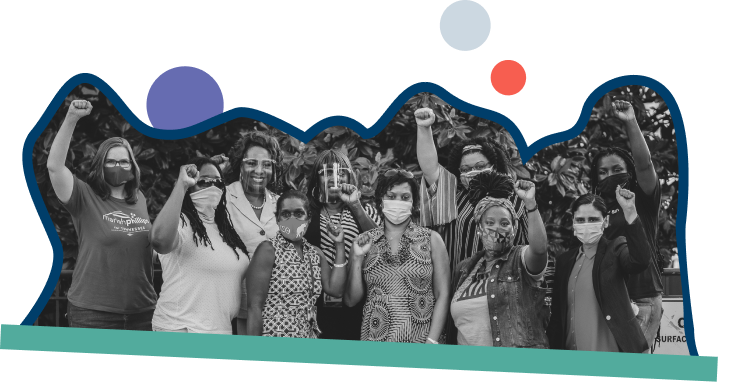We offer 10 recommendations spurred by the interviews, learning, and dialogue in Nashville, with the hopes that these can better support the critical — yet radically under-resourced work — redefining Nashville’s economy to work for all its participants.
1. For national and local funders alike, don’t just give money to the “loudest voices in the room.”
Look closely at the actual landscape of organizing, and center the voices of (often underfunded) Black women leadership at the forefront of change in conversations on questions like inequality, housing, poverty, and other issues hitting communities hard. Recognize that the most established groups with the highest budgets may have time to respond to detailed grant proposals or letters of inquiry, but they may not be doing the actual work on the ground that is shifting conditions for Nashville residents.
2. Expand funder education on the importance of centering race and inequality and structural change and local, base-building organizing to make lasting change on issues like poverty.
As part of this education, create more local spaces of dialogue where foundations and BIPOC organizing leaders can be seen as equals — allow people to break bread together and share their vision for Nashville.

NFG organizes philanthropy so that Black, Indigenous, and people of color communities and low-income communities thrive. We offer funders a political home: a place to connect, strategize, and take action.
3. Recognize the importance of breaking out of silos and providing multi-year, general operating support.
A particular roadblock is the impulse to consider migrant and Black community needs separately, rather than interconnected and solved through mutual collaboration. Fund groups creating those connections on the ground in tangible ways, and fund them with unrestricted funds and with multi-year funding to allow more time for organizations to organize versus seek out funding. Put simply: long term structural change, is going to take long term funding. Or, in one interviewee’s words, “You can’t move mountains with garden tools.”
4. Consider revamping and simplifying the funding application process, especially in times of crisis like the pandemic.
Local Black women-led startup organizations like Stand Up Nashville (SUN) and The Equity Alliance (TEA) with smaller budgets may not be able to provide all application requirements (such as audited financial statements) or multi-page reports like a larger multi-million dollar nonprofit, but are worthy of funding nonetheless. Some foundations have moved to short interviews for applications and reports, and other streamlining of bureaucratic application processes. Prioritize moving resources out the door quickly and efficiently.

5. Support regional grassroots work and shared infrastructures.
Groups like Stand Up Nashville and the Central Labor Council of Nashville & Middle Tennessee that connect the dots on economic and social issues and that bridge the complex regional geography of the Metro area. Support the efforts to link such networks across the state, including by groups like TEA working on statewide voter mobilization, and thus give Nashville a broader voice (counter to the pre-emption bias).
6. Expand the potential for more democratic co-governance and transforming Nashville’s history of secretive power.
Funders can do this through the SUN Boards and Commissions Leadership Institute, TEA’s Political Organizing and leadership training and newer (c)(4) efforts like the Justice League PAC, thus creating better representation of Black, Latinx, unhoused, LGBTQ and other marginalized residents. Read more about the co-governance model here.
7. Increase knowledge of the importance of funding government services locally and expanding fair share taxes.
This will support structural change versus charity models with less stable and unreliable budgets. Consider the importance of the public sector as a source of reliable, unionized employment, and wealth-creation, especially in Nashville and for Black residents.
8. Develop knowledge of actual community needs and support local, community-grounded research efforts.
This includes research on labor, economic, and social issues like the Our Fair Share research advanced by The Equity Alliance.

9. As funders, engage with and bring corporate donors into the conversation on structural racism.
Funders are an increasingly larger part of the Nashville landscape. Also involve local cultural and sports figures as donors. NBA and athletes offer a strong potential set of donors, and have already contributed to issues like voter engagement. To be aware of, historically in the country music scene few musicians are willing to risk their careers to speak out on racial inequality, fearing that their market/demographic will disagree with their political stance. But that does not mean music executives cannot be brought to the table to help contribute to the vision of social justice, especially through pooled funds and small donor mechanisms.
10. Further learning with local funders and donors on how to create more democratic, joint mechanisms for funding.
Learn more about participatory grantmaking and how to reduce the burden on funders and communities by giving power to communities over the distribution of funding. Implement such mechanisms within foundations locally.
For more resources on this connect with funder learning communities and collaborative funding spaces like NFG's Amplify Fund, which makes general operating grants to Black, Indigenous, and people of color led organizations to build power in their communities and make decisions about the place where they live. Amplify’s Nashville strategy is driven by a locally led grantmaking strategy. Learn more about this co-created process and the driving theory of change here.

